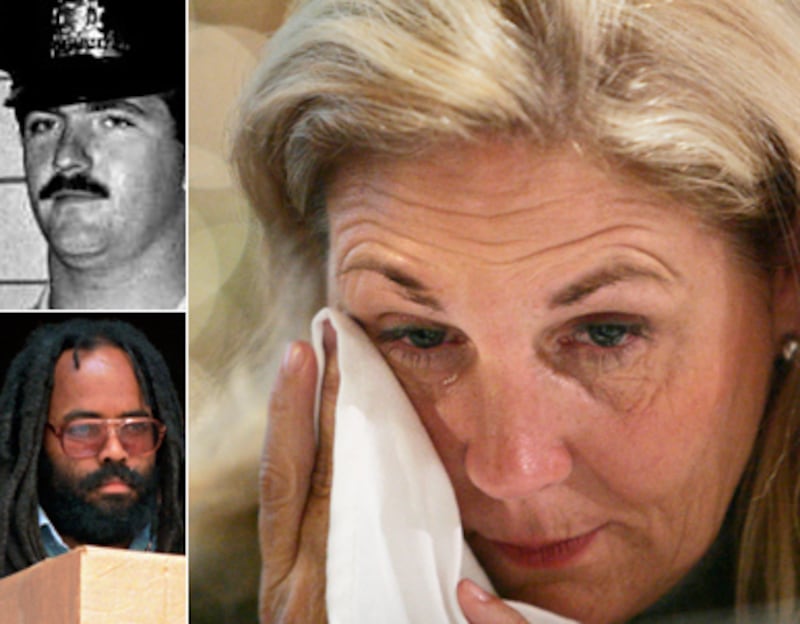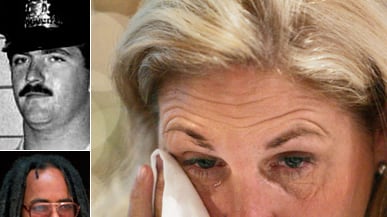Thirty-one years ago Tuesday, newlyweds Maureen and Danny Faulkner departed for a honeymoon in Hawaii. Each was in their mid-twenties. Danny was a young Philadelphia policeman. Their marriage would last less than two years, cut short on a cold December morning when Danny was murdered in cold blood by Mumia Abu-Jamal during a routine traffic stop.
On Tuesday afternoon, Danny’s widow, Maureen, will return to a location in which she has spent significant time over the last three decades: a courtroom. Even though it’s been 28 years since Abu-Jamal’s conviction, his appeal continues, and the case shows no signs of ending any time soon. The murder of Officer Danny Faulkner and the coddling of his killer by our judicial system are an international disgrace and proof that in certain jurisdictions, the death penalty exists in name only.

At approximately 4 a.m. on Dec. 9, 1981, Officer Faulkner stopped Abu-Jamal’s brother, William Cook, as he drove the wrong way on a one-way street in Philadelphia’s red light district. Abu-Jamal, a former Black Panther who was then an out-of-work journalist driving a cab, watched from across the street. A scuffle ensued between Faulkner and Cook. Abu-Jamal ran across the street and emptied the gun registered in his name into Faulkner. His five-shot Charter Arms revolver contained five spent shells. Ballistics tests verified that the bullets found in Abu-Jamal’s gun were the same caliber (.38), brand (Federal Arms), and unique type (+P with a hollow base) as the fatal bullet that was removed from Faulkner’s brain. Before his death, Faulkner returned fire and shot Abu-Jamal in the stomach. Both men were taken to the same hospital, where Abu-Jamal was heard to say, “I shot the motherfucker and I hope the motherfucker dies.” The prosecution called four eyewitnesses to testify at the 1982 trial, who collectively presented a start-to-finish view of the murder, identifying Abu-Jamal. The defendant was a disruptive force at trial and an impediment to his own defense. A racially mixed jury convicted him of murder and sentenced him to death.
Back then, Maureen Faulkner thought she’d just received closure. Little did she know that this story was only beginning.
Watch the music video for "The Murder of Daniel Faulkner" by Gary Cherone.
Appeal after cowardly appeal and stall tactic after frivolous stall tactic has kept Abu-Jamal’s heart beating, his case open, and the death of a police officer in the news. Over these intervening years, the convicted cop killer has become a cause celebre for those who want to abolish the death penalty. A long list of defense lawyers who have represented Abu-Jamal over the years have been successful in casting their client as a political prisoner framed for a murder he did not commit.
Dozens of celebrities have come to Abu-Jamal’s defense, among them Maya Angelou, Alec Baldwin, Naomi Campbell, Noam Chomsky, Ben Cohen (co-founder of Ben & Jerry’s ice cream), Roger Ebert, Henry Louis Gates, Danny Glover, Whoopi Goldberg, Casey Kasem, Spike Lee, Michael Moore, Paul Newman, Salman Rushdie, and Sting.
“I think it’s time to begin calling it ‘The System’ instead of the ‘The Justice System,’” said Maureen Faulkner.
Danielle Mitterrand, France’s former first lady, has traveled to San Francisco to attend a news conference with Abu-Jamal’s lawyer. South African Archbishop Desmond Tutu and members of the Danish parliament have advocated for clemency.
In 1995, 100,000 people in Rome signed a petition demanding that Abu-Jamal’s execution be stopped. Six years later, Paris’ City Council declared Abu-Jamal an honorary citizen—an honor he has received in about 20 other cities. In the Parisian suburb of Saint-Denis, a street was named after him. In March 2009, former German Minister of the Interior Gerhart Baum attended an event in support of Abu-Jamal held at the Academy of the Arts in Berlin.
For his part, Abu-Jamal has been more productive on death row than ever before. Killing a cop jump-started his career as a journalist. His supporters often describe him as a “brilliant” or “award-winning” journalist implicated by a corrupt police department and racist prosecutors. In fact, when he executed Officer Faulkner in cold blood, Abu-Jamal was working as a cabbie because his “news” stories had become so infected by his radical political views that no reputable station in Philadelphia would employ him.
Yet from prison, Abu-Jamal has written numerous books and articles. He has delivered several college commencement addresses. He was the impetus for a teach-in organized by some Oakland public school teachers in 1999. He has festered so long on death row and so inflated his profile that fellow inmates now call him “Pops.” This while natural causes have taken a number of the Faulkners’ family and friends.
The killer has been aided, of course, by celebrities and haughty foreign politicos whose anti-death-penalty zeal got the better of their good sense. But the real enabler is a criminal “justice” system that has become overrun with individuals who are afraid to put the hammer down. In Pennsylvania, where Abu-Jamal remains imprisoned, and in many places throughout the country, the death penalty is a sham. And the justice sought by the Faulkner family has been traded for almost 30 years’ worth of technicalities, subterfuges, and excuses. It’s nothing short of disgraceful.
In the saga’s current installment, the 3rd U.S. Circuit Court of Appeals is re-examining whether the original 1982 jury could have been confused by the judge’s instructions about the aggravating and mitigating circumstances that led to Abu-Jamal’s death sentence. Aggravating circumstances are events argued by the prosecution—in this case, that the victim was a police officer killed in the line of duty. As the term implies, mitigating circumstances are argued by the defense. In the case of Abu-Jamal, the defense stipulated that he had no prior criminal record.
Maureen Faulkner will be back in court Tuesday to hear Abu-Jamal’s defense team argue that the jury may have been confused by the wording of the verdict slip, given that the word “mitigating” appeared in close proximity to the word “unanimous.” Not that the jury was confused, mind you, but that the possibility exists that one or more members may have been. That is how ludicrous the case has become.
On the eve of this latest appellate hearing, Maureen Faulkner sent me a long, emotional email that included this harrowing thought: “As I write this I can’t help but say to myself, Happy Anniversary Dan—you deserve more from this country and this city you were born in, served so well and died for. I think it’s time to begin calling it ‘The System’ instead of the ‘The Justice System.’”
“I feel very, very sad, particularly for Maureen Faulkner, who has faced this for so many years and it just doesn’t seem to be coming to an end,” said Joe McGill, the prosecutor in the original 1982 trial. “Yes, I understand the right for defense to fight to the last possible moment when you have such a serious sentence. I understand that and that’s the way it should be. However, this case is absolutely definite in its facts, in its evidence, and in the decision of the jury.”
McGill’s role was to convict Abu-Jamal. Hugh Burns’ job as chief of the Philadelphia district attorney’s appeals unit is to hold the conviction. “I can be sure that no one in 1982 imagined that we would still be litigating this case in the 21st century,” he told me on Monday.
And lest anyone consider Maureen Faulkner’s case an outlier, consider: Pennsylvania’s outgoing governor, Ed Rendell, who was Philadelphia’s district attorney at the time of Officer Faulkner’s murder, has signed at least 113 death warrants during his eight years in office. Not one has been carried out. The last three executions in his state have taken place only because the inmates waived their appeals process. In other words, they asked for it. (Pennsylvania’s last contested execution was carried out in 1962.)
Today, nobody convicted and sentenced to death for killing a police officer has any reason to fear being executed. Friends and families of those killed, however, should steel themselves for decades spent reliving the tragedy via appellate proceedings and the news coverage they inevitably will receive.
All of which has forced this country to a crossroads. If we’re not committed to enforcing the death penalty, we should drop it entirely. As it stands, it has devolved from deterrent to deception—a mirage of justice that serves only to victimize further those already dealing with unimaginable pain. It has been eroded to the point of impotence, while the real victims are forced to slog through decades-long retellings of the details of their loved ones’ murder. In that discomforting sense, the system has become more a haven for criminals than a defender of victims.
Which is why I say enforce it for real drop it for good.
Of course, should the latter suggestion come to fruition, some would welcome it as a victory over a barbaric form of punishment.
Tell that to Maureen Faulkner. Monday was her 31st wedding anniversary. Her husband, murdered in cold blood nearly 29 years ago, wasn’t around to celebrate with her. But his killer, a death sentence hanging over his head for decades, is alive and well at age 56.
Michael Smerconish is a nationally syndicated radio host. His latest book is Instinct: The Man Who Stopped the 20th Hijacker.






